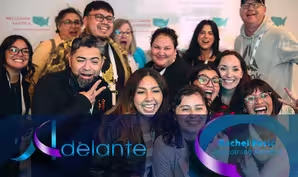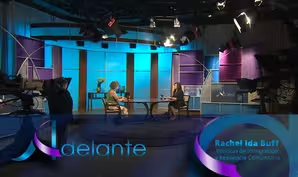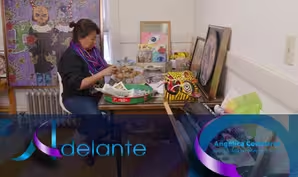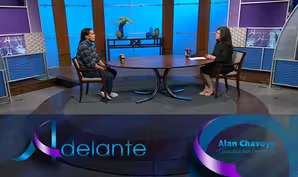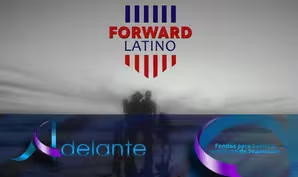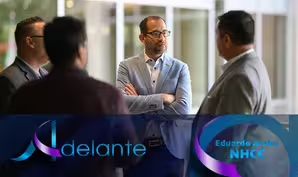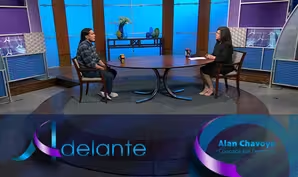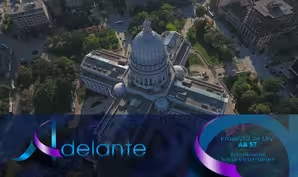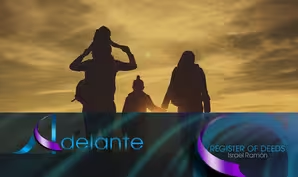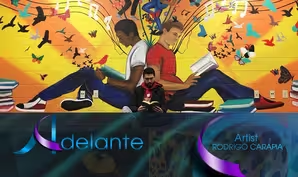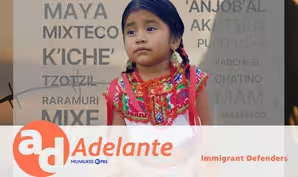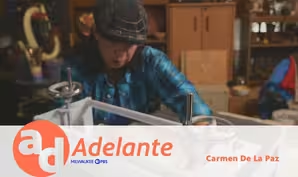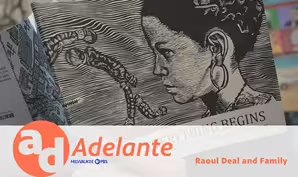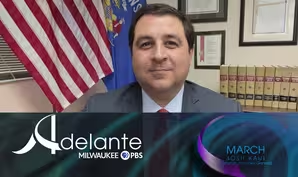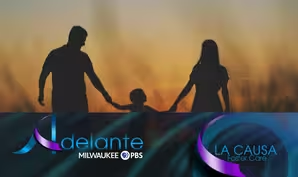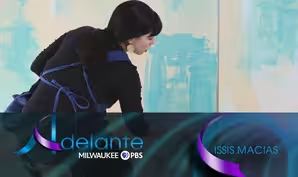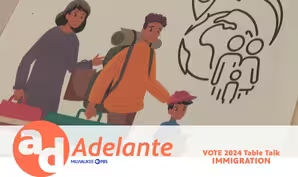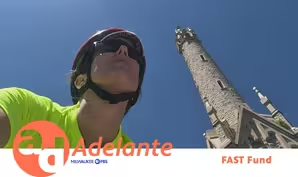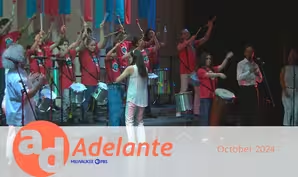Adelante
UMOS Change of Leadership
Clip: Season 26 | 10m 4sVideo has Closed Captions
UMOS Change of Leadership
UMOS Change of Leadership
Problems playing video? | Closed Captioning Feedback
Problems playing video? | Closed Captioning Feedback
Adelante is a local public television program presented by MILWAUKEE PBS
This program is made possible in part by the following sponsors: Johnson Controls
Adelante
UMOS Change of Leadership
Clip: Season 26 | 10m 4sVideo has Closed Captions
UMOS Change of Leadership
Problems playing video? | Closed Captioning Feedback
How to Watch Adelante
Adelante is available to stream on pbs.org and the free PBS App, available on iPhone, Apple TV, Android TV, Android smartphones, Amazon Fire TV, Amazon Fire Tablet, Roku, Samsung Smart TV, and Vizio.
Providing Support for PBS.org
Learn Moreabout PBS online sponsorshipJOSE MARTÍNEZ: I'm originally from Texas.
I was born in Mercedes as a small community then.
It's a big community now.
I've lived in Wisconsin now for about 29 years.
My family, my dad is originally from Oaxaca, Mexico.
He met my mother.
My mom is originally from Mercedes, U.S. citizen, and they got married.
My mother was a single parent.
My dad unfortunately, he died at age 39.
At age 17 I decided to join the military.
I saw the military as one of the means.
One, I had a passion to serve our country.
And then two, it was a means perhaps in trying to decide in terms of my career pathway.
So when I first came to UMOS, and I was in '95, I was intrigued with the services that they were providing services to farm worker families.
I was a farm worker child myself, my family, we all used to migrate.
So I said, Wow, this would be a wonderful opportunity to come back from the other yet and be able to work with families and children and create some impact.
So I worked for UMOS for about a year and a half or so.
Then I got invited to go back to Texas to assist our organization and to do the same services.
And then soon after that, I came back in '98, I believe.
And so here I am today, 29 years later, right, that I'm still here with UMOS.
Having been blessed with the afforded opportunity to work in various projects, learned the program well because I am a believer that it's not just doing the oversight of a project, but knowing the project well so you can best guide your employees, right?
When Lupe said, Well, I'm thinking of also retiring, that I assumed the interim CEO and then obviously, haven't been selected as the new CEO for UMOS back in September of 2024.
So certainly, it's pivotal for me in my life.
Nothing that I said that I want this, or I earned this, but more so is doing what we enjoy doing best.
PATRICIA GÓMEZ: Can you talk about your plans for the future of UMOS?
JOSE MARTÍNEZ: Well, one of the key elements, I think, being a data-driven programmer and agency means that we use our technology and we use our technology to our best core we can in order for us to make the most formidable decisions to be able to continue more programming.
So in the slimmer and trimming perspective, that means that we have to look at programs or software's that are out there and perhaps be able to change those software's so they can give us the best information.
So that's one of the elements that we have certainly made some changes.
The other one is we also change in creating and developing, if not purchasing the UKG system because we want a better robust system that has an onboarded component also keeps a lot of this information as it relates to employee data, keeps it in file, keeps it electronically, and we wanted to change from that perspective.
The other element that it has, it has those performance components like appraisal systems.
It also has professional development built in.
In terms of numbers with employees, we're hitting about 956 employees, Más o menos, we're up there with an annual right now we're hitting about $150 million as a program.
I tell you, it's a blessing to be at that level and it's a blessing to be able to provide services to families and children in multiple states, right?
PATRICIA GÓMEZ: We also have a new Latino community.
This community is changing.
How are you going to face this factor?
JOSE MARTÍNEZ: It's not just serving the farm worker population, but making sure that UMOS is representative of all populations that you must serve.
So by the important that whether it be a Republican or Democrat that they understand, the investment in the services today, whether we do consider them as safety net programs or we consider them something else is so vital for our families that sometimes they're living in bigger wages.
Nowadays as well, it is so important to also show impact because for every dollar that you invest, you want to be absolutely sure that us taxpayers, we're seeing a return in that investment.
And so therefore I believe as a presidency and CEO of UMOS now, it's important for us to be able to show the impact and the investment.
Lupe has been at the helm, was at the helm for 49 years.
So we did an event called the passing of the torch, meaning that as Lupe is ready to set himself his vision on doing other things for the community, then it's passing the torch to me in terms of being able to continue providing the same quality services and the same impact of services in the communities.
PATRICIA GÓMEZ: Jose, these are difficult times for Latinos.
There is a new administration, a new presidential administration coming.
What are your thoughts on that?
JOSE MARTÍNEZ: We are living in a very different Era where Moniz folks as well, the Trump used to control the House and the Senate then he's coming in and he is said he's going to do a lot of things and perhaps maybe it's just a lot of talk.
But we just don't know, right?
And I tell folks that sometimes when there are some gain changers that could have an impact in the lives of families and children, then we can't stay idle.
We have to plan for the worst in many instances.
We have to prepare.
There's a lot of talk in terms of programs that they're looking and cutting, whether it be the likely programs, whether it be we have programs, head start programs, snap programs, nutritional programs, and the list goes on.
So in that aspect, we have to be caught as that in terms of what it is exactly that they're planning and then how can we best communicate to both sides as they are why these programs are necessary and why these programs had created in the past positive impact and how they in the future can create positive impact.
I'm a realist as well and I understand the federal government we're sitting right now at $36 trillion.
It's a deficit that we're sitting on.
Can we continue to spend the way we're spending?
No, we can't.
We have to understand the fact that sooner or later if we cannot cover our debt through the collection of taxes, then essentially something's got to give.
We have to make some tough decisions.
Here in Wisconsin alone, there's the most recent data back in 2022 had roughly about 70,000 undocumented.
Whether you say, well, it represents 50% of the agricultural workforce, the dairy workforce, the meat packing workforce, construction workforce, the hospitality workforce, the restaurant workforce, and the list goes on in terms of industry.
Or we can say it roughly represents 20% of that industry that is still an impact.
Can you imagine removing that many from the workforce?
What's going to happen to our economy here in the center of Wisconsin?
So then are we ready to pay higher prices for food production?
Because it has to come somewhere.
Right now, we are struggling.
When I say we the nation is struggling for affordable housing.
We don't have enough affordable housing for our families, for our children.
So does it mean now, does it make sense that we want in to say, well, folks, removing undocumented makes sense.
So therefore, as a result of that, you're going to pay a higher price for homes.
Does it really make sense?
So it does it.
So there are other alternatives.
And certainly, I would like for on both sides of the aisle to revisit the Workforce Modernization Act, because that was at least the first attempt that had support and got our support several years ago to a pathway to citizenship.
That's the best thing that we can do for families and children.
And it doesn't make sense.
It really doesn't make sense when we talk about separating families and children again.
We lost 1500 kids when this happened for mass deportation.
And we still haven't been able to find many children.
It's not good for us as nation.
The in terms of advocacy, it's going to be an integral approach.
It's not only UMOS, but it's a collective approach with all Latino organizations, with all organizations across the aisle, that we have to be advocating for social justice for what is right.
It's going to take coalition, a coalition approach.
Because again, if we can all come together and have that genuine understanding in terms of what are the real issues, and then what are some probable solutions, and then be able to come to the aisle and present those issues and say, Hey, look, this is good for business.
Hey, look, this is good for families and children.
Look, this is going to help our economy.
And if folks begin to maybe dismiss the rhetoric and focus on those aspects, then I think we can get over the turtle as a nation.
And perhaps maybe these can be the first steps of healing our country, right?
Because right now we're so decisive, so divine.
We are a country of mixed races, but that's what makes it so unique.
We are a country of different cultures, and this is why we can celebrate, right, together collectively.
Every day that I wake up, it's a blessing that I have given the fortitude to create some impact.
And I know that my role as an administrator, I don't see clients face to face anymore, but then when I do have the opportunity to see them and they say, Thank you to UMOS.
It has a profound impact on my life because I know that UMOS is truly creating better futures for our community.
[MUSIC]
Rachel Peric - Welcoming America
Video has Closed Captions
Clip: S26 | 9m 53s | Welcoming America plays a crucial in building bridges and creating environments that thrive. (9m 53s)
Rachel Ida Buff, Lessons that families at risk of deportation can learn
Video has Closed Captions
Clip: S26 | 10m 19s | Dr. Rachel Ida Bluff is with us to discuss lessons that families at risk of deportation can learn. (10m 19s)
Mexican Artist Angélica Contreras transforms canvas
Video has Closed Captions
Clip: S26 | 5m 43s | From her studio in Madison, Wisconsin, Mexican artist Angélica Contreras transforms the canvas (5m 43s)
Video has Closed Captions
Clip: S26 | 7m 8s | Teresa Mercado, Executive Director of Mexican Fiesta discusses Cesar Chavez's impact (7m 8s)
Forward Latino Fondos para Familias
Video has Closed Captions
Clip: S26 | 6m 42s | The City of Milwaukee awarded $100,000 to Forward Latino as part of an effort to support families (6m 42s)
Video has Closed Captions
Clip: S26 | 7m 9s | NHCC addresses the critical need for Hispanic representation in corporate leadership. (7m 9s)
Camino a la Libertad - Alan Chavoya
Video has Closed Captions
Clip: S26 | 6m 36s | Alan Chavoya, Professor of Philosophy, informing undocumented families about legal and human rights. (6m 36s)
Video has Closed Captions
Clip: S26 | 8m 59s | The debate over cooperation between local authorities and federal immigration agencies. (8m 59s)
Video has Closed Captions
Clip: S26 | 9m 12s | From the Office of the Register of Deeds, attorney Israel Ramón talks about the services his office (9m 12s)
Video has Closed Captions
Clip: S26 | 5m 37s | Rodrigo Carapia brings a gift to children and young people in schools and correctional facilities. (5m 37s)
Video has Closed Captions
Clip: S26 | 10m 4s | UMOS Change of Leadership (10m 4s)
Video has Closed Captions
Clip: S26 | 5m 25s | Margaret Cargioli, Director of Policy and Advocacy at the Immigrant Defenders Law Center (5m 25s)
Video has Closed Captions
Clip: S26 | 10m | Carmen de la Paz was in charge of the Waukesha Strong Tile Project. (10m)
Video has Closed Captions
Clip: S26 | 7m 52s | Continuum is an exhibition presented in honor of the work of Raoul Deal. (7m 52s)
Wisconsin State Attorney General Josh Kaul Full Interview
Video has Closed Captions
Clip: S26 Ep6 | 17m 57s | Full interview with State AG Josh Kaul (17m 57s)
Video has Closed Captions
Clip: S26 Ep6 | 5m 14s | Karen Steinbach of La Causa talks about the foster care program offered by this organization. (5m 14s)
Discover the art and career of Issis Macias
Video has Closed Captions
Clip: S26 Ep6 | 9m 52s | Discover with us the art and career of Issis Macias (9m 52s)
Artist Congh López, originally from Oaxaca
Video has Closed Captions
Clip: S26 Ep5 | 6m 21s | Artist Congh López, originally from Oaxaca, invites us to discover his artistic techniques. (6m 21s)
Vote 2024 Table Talk on Immigration
Video has Closed Captions
Clip: S26 Ep1 | 9m 57s | 4th part of the series “Vote 2024 Table Talk” - focus on Immigration (9m 57s)
Video has Closed Captions
Clip: S26 Ep1 | 7m 55s | Local 212 MATC Fast Fund is a non-profit organization that provides assistance to MATC students. (7m 55s)
Video has Closed Captions
Clip: S26 Ep1 | 6m 5s | Bembé Drum and Dance is a community-based cultural organization that promotes intergenerational art (6m 5s)
Providing Support for PBS.org
Learn Moreabout PBS online sponsorshipSupport for PBS provided by:
Adelante is a local public television program presented by MILWAUKEE PBS
This program is made possible in part by the following sponsors: Johnson Controls
